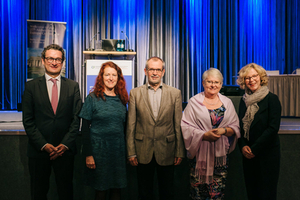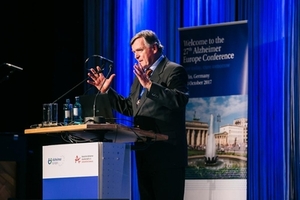Berlin, 2 October 2017 – The Alzheimer Europe Conference “Care today, cure tomorrow” was formally opened today by Iva Holmerová, Chairperson of the organisation who welcomed close to 750 participants from 42 countries. Over the next two days, the conference will bring together 181 speakers, as well as 216 poster presenters to share their research, projects and experiences.  Together with Sabine Jansen, Executive Director of Deutsche Alzheimer Gesellschaft and Bernd Heise, a member of the German association’s Advisory Board of people living with dementia, she extended a special welcome to the 38 people with dementia attending the conference, as well as their carers and supporters: “We are delighted that we do not just speak about people living with dementia at our conference, but speak with them and fully involve them as speakers and in the planning process of our events.” Together with Sabine Jansen, Executive Director of Deutsche Alzheimer Gesellschaft and Bernd Heise, a member of the German association’s Advisory Board of people living with dementia, she extended a special welcome to the 38 people with dementia attending the conference, as well as their carers and supporters: “We are delighted that we do not just speak about people living with dementia at our conference, but speak with them and fully involve them as speakers and in the planning process of our events.”
During the opening ceremony, dementia was highlighted as one of the key public health challenges at European, national and local level. Matthias von Schwanenflügel, Ministry for Family Affairs, Senior Citizens, Women and Youth and Regina Kraushaar, Ministry of Health gave an overview of the activities of Berlin and Germany to support people with dementia and their carers, raise awareness, combat stigma and support greater research in the field. The German “Allianz für Menschen mit Demenz” and the „Demenz Partner“ campaign were showcased as examples of good practice. Harnessing the challenges and opportunities of early diagnosis and novel treatments In his keynote presentation “Time is on our side”, Prof. Alexander Kurz from the Technical University in Munich gave an overview of the challenges and opportunities which future treatments for Alzheimer’s disease could raise. He expressed his hope that treatments currently under development will slow down the progression of the neurodegenerative process, particularly if administered at the early stage. Such a novel scenario could imply more years of life, more time and better capability to adapt to and cope with cognitive and functional impairment, more years spent at mild and moderate rather than at more advanced stages of the disease, and possibly even an escape from severe dementia and dependence. He called on Alzheimer associations, health care professionals and society at large to collaborate and assess how best to use this extra time provided by early diagnosis and novel  treatments. treatments. The opening ceremony was brought to an end with a surprise rendition of a number of Berlin songs by the Board and staff of the conference co-host, the German Alzheimer’s association. Prior to the opening ceremony, a number of ancillary meetings had taken place. Alzheimer Europe organised its Annual General Meeting with the representatives of the national member organisations of the association to update them on its activities in 2016 and its plans for 2018.
The organisation’s European Working Group of People with Dementia also met on 1 October for a full day to finalise their involvement in the conference and to rehearse their presentations for the special symposium the group is organising to highlight the impact of dementia. INTERDEM and Alzheimer Europe: Collaborating to change perceptions, practice and policy The INTERDEM network of researchers interested in psychosocial interventions also held its Annual Meeting prior to the conference with a record number of close to 100 researchers attending. Alzheimer Europe and INTERDEM used the opportunity to sign a memorandum of understanding highlighting their willingness to collaborate.  In the memorandum, both organisations confirmed that they share a common vision of “changing perceptions, practice and policy in order to improve the quality of life of people with dementia and their carers” and affirmed the following rights of people with dementia: In the memorandum, both organisations confirmed that they share a common vision of “changing perceptions, practice and policy in order to improve the quality of life of people with dementia and their carers” and affirmed the following rights of people with dementia:
- The right to a timely diagnosis;
- The right to access quality post diagnostic support;
- The right to person-centred, coordinated, quality care throughout their illness;
- The right to equitable access to treatments and therapeutic interventions;
- The right to be respected in their community as an individual with capacities and limitations.
For further information, contact: Jean Georges, Executive Director of Alzheimer Europe, 14, rue Dicks, L-1417 Luxembourg, Tel.: +352-29 79 70, Fax: +352-29 79 72, jean.georges@alzheimer-europe.org Notes to editors: Alzheimer Europe is the umbrella organisation of national Alzheimer associations and currently has 39 member organisations in 34 European countries. (www.alzheimer-europe.org).
The European Working Group of People with Dementia currently has ten members nominated from ten of Alzheimer Europe's member organisations:  - Chairperson: Helen Rochford Brennan (Ireland)
- Vice-Chairpersons: Alv Orheim (Norway) and
- Chris Roberts (Wales, UK)
- Members: Idalina Aguiar (Portugal)
- Nina Balacková (Czech Republic)
- Karin Gustafsson (Sweden)
- Amela Hajric (Bosnia and Herzegovina)
- Carol Hargreaves (UK - Scotland)
- Petri Lampinen (Finland)
- Helga Rohra (Germany).
Interdem is a pan-European network of researchers collaborating in research on and dissemination of Early, Timely and Quality Psychosocial Interventions in Dementia aimed at improving the quality of life of people with dementia and their supporters, across Europe (www. http://interdem.org/). Information on the activities undertaken by the Alliance for people with dementia in Germany: and the Dementia partner campaign can be found here http://www.allianz-fuer-demenz.de/service/meldungen/zwischenbericht-zur-umsetzung-der-agenda.html and here https://www.demenz-partner.de/startseite.html.
Follow the event on twitter #27AEC
|